中考英语语法一点通课件——Lesson 4 形容词和副词、介词
文档属性
| 名称 | 中考英语语法一点通课件——Lesson 4 形容词和副词、介词 |

|
|
| 格式 | pptx | ||
| 文件大小 | 6.1MB | ||
| 资源类型 | 试卷 | ||
| 版本资源 | 通用版 | ||
| 科目 | 英语 | ||
| 更新时间 | 2022-04-11 00:00:00 | ||
图片预览


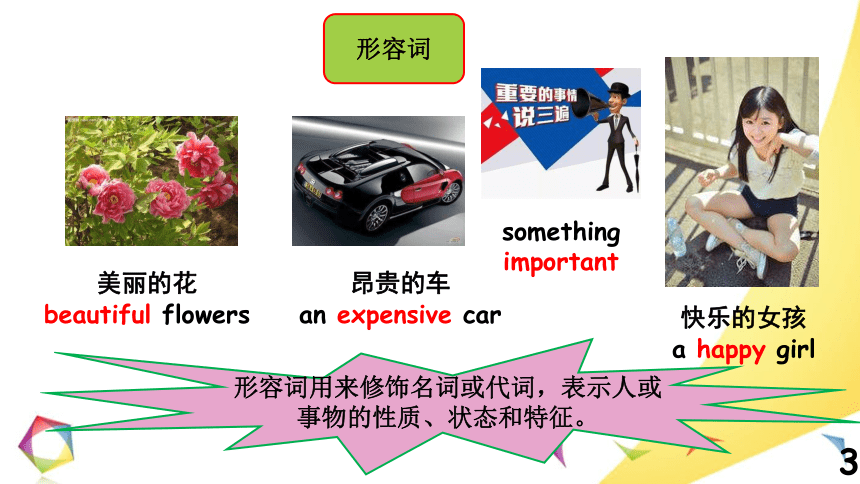
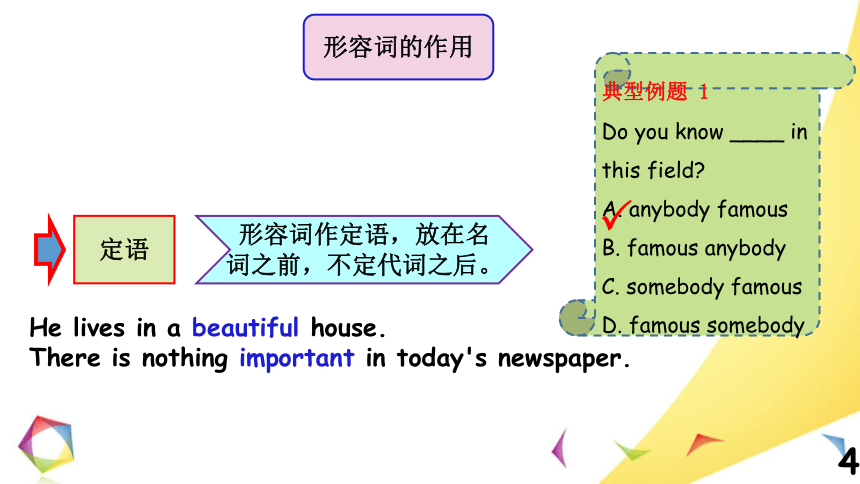
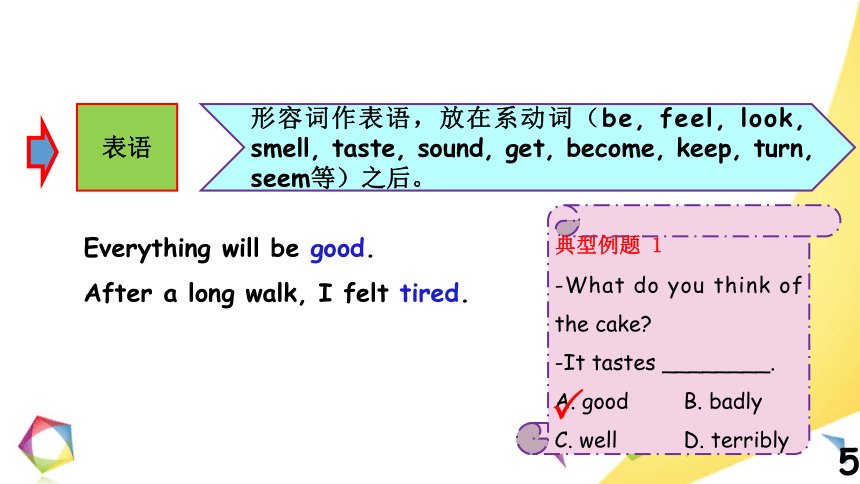
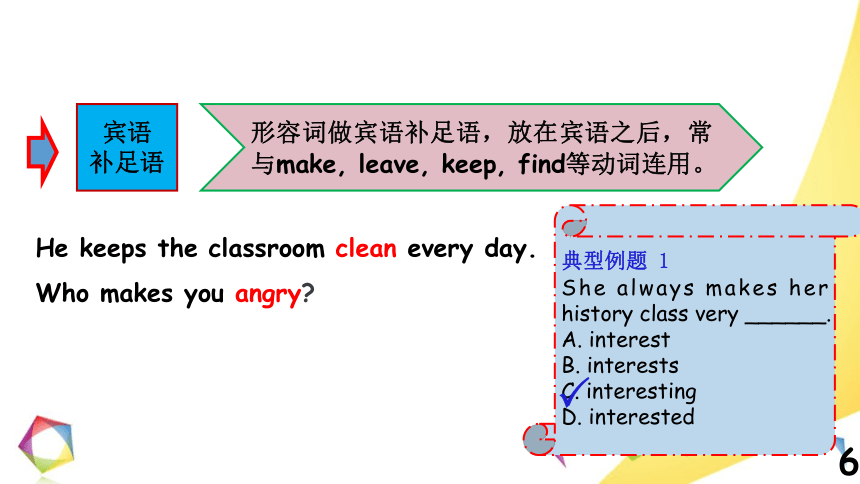
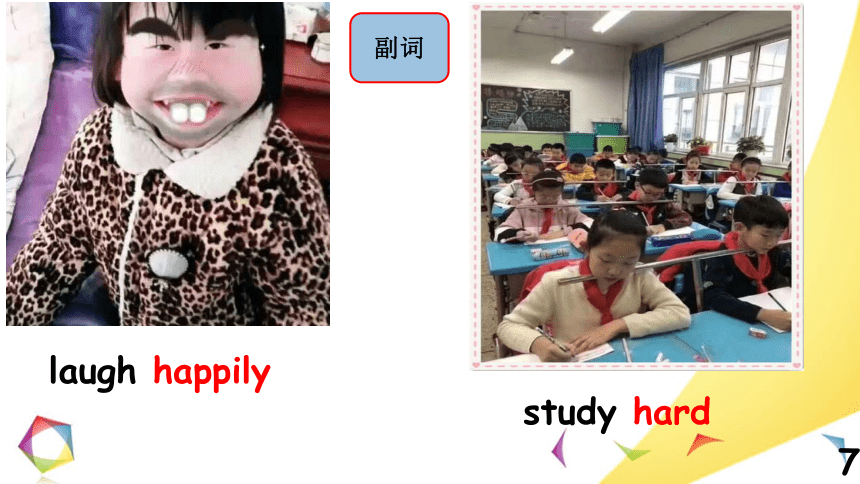

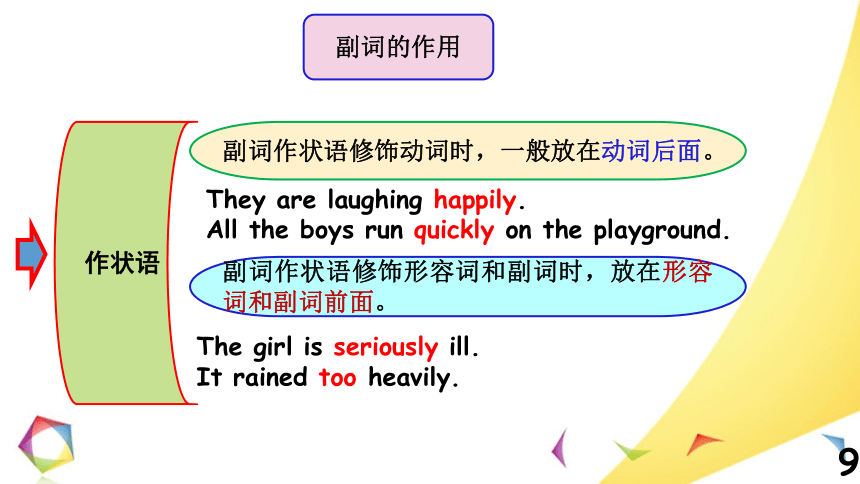
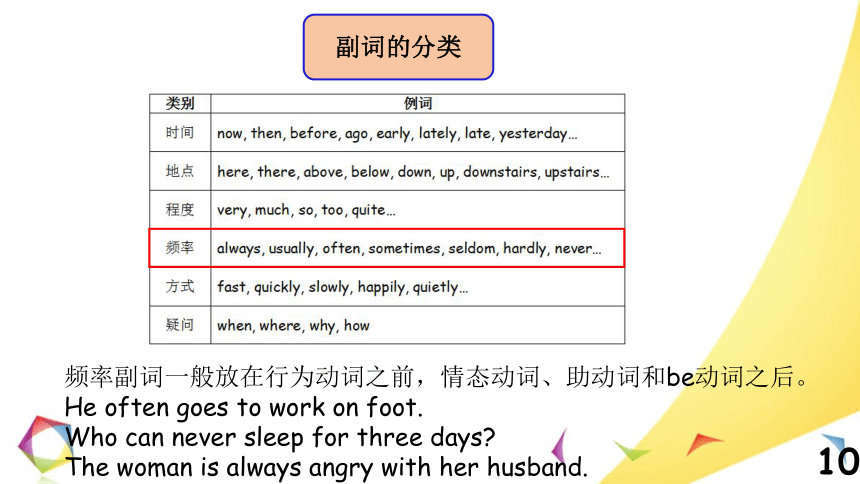
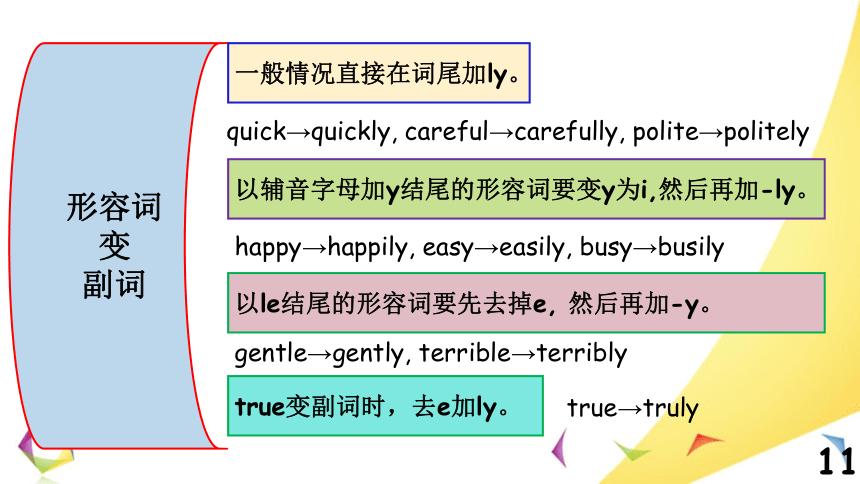
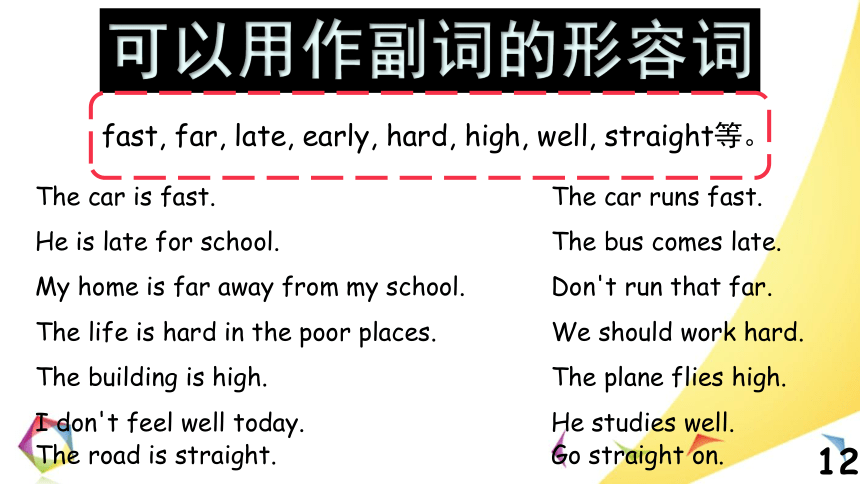
文档简介
(共51张PPT)
Lesson 4形容词和副词、介词形容词和副词形容词美丽的花beautifulflowers昂贵的车anexpensivecar快乐的女孩ahappygirl形容词用来修饰名词或代词,表示人或事物的性质、状态和特征。somethingimportant形容词的作用定语形容词作定语,放在名词之前,不定代词之后。He lives in abeautifulhouse.There is nothingimportantin today's newspaper.典型例题1Do you know ____ in this field A. anybody famousB. famous anybodyC. somebody famousD. famous somebody表语形容词作表语,放在系动词(be, feel, look, smell, taste, sound, get, become, keep, turn, seem等)之后。典型例题1-What do you think of the cake -It tastes ________.A. goodB. badlyC. wellD. terriblyEverything will begood.After a long walk, I felttired.宾语补足语形容词做宾语补足语,放在宾语之后,常与make, leave, keep, find等动词连用。典型例题1She always makes her history class very ______.A. interestB. interestsC. interestingD. interestedHe keeps the classroomcleanevery day.Who makes youangry 副词laughhappilystudyhardtoouglylovesodeeply副词的作用作状语副词作状语修饰动词时,一般放在动词后面。They are laughinghappily.All the boys runquicklyon the playground.副词作状语修饰形容词和副词时,放在形容词和副词前面。The girl isseriouslyill.It rainedtooheavily.副词的分类频率副词一般放在行为动词之前,情态动词、助动词和be动词之后。He often goes to work on foot. Who can never sleep for three days The woman is always angry with her husband.形容词变副词一般情况直接在词尾加ly。quick→quickly, careful→carefully, polite→politely以辅音字母加y结尾的形容词要变y为i,然后再加-ly。happy→happily, easy→easily, busy→busily以le结尾的形容词要先去掉e, 然后再加-y。gentle→gently, terrible→terriblytrue变副词时,去e加ly。true→truly可以用作副词的形容词fast, far, late,early,hard, high, well, straight等。The car is fast. The car runs fast.He is late for school. The bus comes late.My home is far away from my school. Don't run that far.The life is hard in the poor places. We should work hard.The building is high. The plane flies high.I don't feel well today. He studies well.The road is straight. Go straight on.highhighlywidewidelydeepdeeplycloseclosely具体含义抽象含义The plane flies high in the sky. We spoke highly of his courage.The fire spread wide. English is widely used in the world.He dives deep into the sea. The couple love each other deeply.Don't sit close to the window. They are closely related.小试牛刀1.Are you________at English Can you speak English________ ( good ) 2. How are you I'm________. Do you do________in your study (well ) 3. If we want to be________,we must eat________.(healthy) 4. Look! They are playing________in the park. They are very________. (happy) 5. We must listen to the teacher________.(careful) 6. He is very________and closed the door________.(angry) 7. Tom can work out the problem________.(easy) 8. It was a ________ rain. It also rained _________ yesterday. (heavy)goodwellwellwellhealthyhealthilyhappilyhappycarefullyangryangrilyeasilyheavyheavily形容词与副词原级的用法“as+形容词/副词原级+as”结构,意为“与……一样”。His father is as old as his mother.Tom studies as carefully as his brother.“not as/so+形容词/副词原级+as”,意为“不如,比不上”。This picture is not so good as that one.Tim does not run so quickly as Jack.比较级和最高级的用法变化规则一般情况直接在词尾加er/est。short-shorter-shortest cold-colder-coldest以e结尾的单词,在词尾加上r/st。wide-wider-widest large-larger-largest单个辅音字母结尾的重读闭音节词,双写末尾辅音字母加er/est。big-bigger-biggest hot-hotter-hottest以辅音字母+y结尾的词,变y为i再加er/est。heavy-heavier-heaviest busy-busier-busiest多音节词在前面加上more/most。beautiful-more beautiful-most beautiful important-more important-most importantgood/well-better-bestmany/much-more-mostlittle-less-leastold-older/elder-oldest/eldestbad/badly/ill-worse-worstfar-farther/further-farthest/furthest不规则变化My father isoldestin my family.(年龄的大小、东西的新旧)She is myeldestsisiter of my eight sisters.(辈分的长幼)He is too tired to walk anyfarther.(具体的距离的远近)He went abroad to studyfurther.(抽象的程度的加深)比较级常用句型用于两者进行比较,结构为“A+ 比较级+than+B”。My bike is more beautiful than hers.表示两者之间选择,用“which/who+is+比较级,A or B?Which is nearer to the sun, the moon or the earth “比较级+and+比较级”表示“越来越……”The weather is becoming colder and colder.She is becoming more and more beautiful.“the+比较级,the+比较级”表示“越……越……”The harder you study, the better you will be.“the+比较级+of the two”表示“两者中较……的一个”Lucy is the taller of the twins.数量的比较more...than...“比……多”。He has more books than his brother.Tom has more money than Jack.fewer/less...than...“比……少”,可数名词用fewer,不可数名词用less。He has fewer books than his brother.Tom has less money than Jack.the most “最多”。He carried the most boxes of us.Simon drinks the most drink.the fewest/least“比……少”,可数名词用fewest,不可数名词用least。She sang the fewest songs in our class.He finished the least homework of us three.可以修饰比较级的程度副词muchanyevenratherfara littlevery sotoo quite×典型例题1—Do you feel_____better today —Yes,the medicinewoks.A. very B. quiteC. any D. too原级比较和比较级之间的转换This box is not so big as that one.=This box is smaller that that one.This game is not as exciting as that one.=This game islessexciting than that one.=That game ismoreexciting than this one.最高级常用句型三者及以上比较时用最高级,结构为“the+最高级+in/of(among)+ 范围”。The picture is the best of all.Shedances(the)most beautifullyin the class.三者及以上之间选择,“which/who is the 最高级,A, B or C?”。Who is the tallest, Tom, Kate or Bill 形容词最高级前面加序数词,表示“第几最……”。She is the second tallest girl in our class.表示“最……之一”用“one of the 最高级+ 可数名词复数”结构。She is one of the most popular teachers in our school.比较级与最高级之间的互换Tom is taller thanany other studentin his class.Tomis taller thanthe other studentsin his class.=Tom is the tallest in his class.Beijing is bigger thanany other city in China.北京比中国的任何其它城市都大。(北京在中国范围之内,属于中国)Beijing is bigger thanany city in Japan.北京比日本任何城市都大。(北京在日本范围之外,不属于日本)沙场大点兵1. –What delicious cakes! –They will taste _______ with butter.A. good B. better C. bad D. worse2. Bob never does hishomework___Mary. He makes lots of mistakes.A. so careful asB. as carefully asC. carefully asD. as careful as3. –Is your mother badly ill –No, _______, only a little cold.A. serious anythingB. serious nothingC. nothing seriousD. anything serious4. How beautifully she sings! I never heard _______.A. the better voiceB. a good voiceC. the best voiceD. a better voice5.The football match was _______, so the boys were _______ about it.A. excited, exciting B. exciting, excitedC. excited, excited D. exciting, exciting6. This kind of T-shirt look _______ and sells _______ in the market.A. nice, good B. well, well C. nice, well D. good, nice7. Which subject do you like _______, math, Chinese or English A. better B. bestC. wellD. very much8. Since China has been a member of the WTO, English is ______ useful than before.A. moreB. mostC. muchD. very9. Let's enjoy the song Yesterday Once More. It sounds _______.A. wellB. sadlyC. niceD. bad10. –Is the physics problem _______ –Yes. I can work it out _______.A. easy, easily B. easy, easy C. easily, easy D. easily, easily介词on Sundayin the classroomat Christmaswith a knifebehind the doorby bus介词表示与后面的名词或代词之间的关系。介词是一种虚词,不能单独在句中作成分,必须和名词连用,常见的介词可表示时间、地点和方式。时间介词in表示在某世纪、年代、年、月、季节in the 20th centuryin the 1980sin 2016in Julyin summer与morning, afternoon, evening连用表示在上午、下午、晚上in the morning/afternoon/eveningat nightat noonin +一段时间,表示以现在为起点的将来一段时间之后,用于将来时。They will come back in two weeks.on表示“在具体的某一天”on May 10th,1982on Children's Dayon Sunday表示具体某一天的上午、下午或晚上on the morningof October 1st, 2016onSaturdayafternoonon arainynightat表示某一个具体时刻(几时几分)at half past eight用在特定的时候(时节、时机)at the momentat that timein Julyon July 5that 12 o'clockin > on > atbefore在……之前after在……之后from从……开始before lunchafter schoolfrom day to nightfor在一段时间内for a long time方位介词in表示“在……地方”(大地点)in China in Shanghai表示“在……里面”in the box in the bottleat表示“在……地方”(小地点)at school at the station用于门牌号码前at 115 Beijing RoadonoverunderabovebelowABin表示B地在A地范围之内。(包含关系)Beijing is in the north of China.ABon表示A,B地接壤。(外切关系)Sinkiang is on the north of Tibet.ABto表示A,B两地分离。(外离关系)Taiwan is to the southeast of Fujian. behindin front ofin the front of ④betweenamongintoout ofacrossthroughto到……go to schoolthrow the ball to menear/by/beside在……旁边方式介词byby+交通工具by bus by carby train by planewithwith+工具with a knife和……一起go with me带有a girl with long hairin使用某种语言in English其它介词“关于”about表示一般意义上的相关,专业性不强。The old man is telling a story about wolves.on强调专业上相关,专业性很强。She is making a speech on politics of China.likelike作介词,表示“像、好像”,常与系动词连用。What he said sounds like a good idea.The teacher treats the students like his children.asas作介词,表示“作为”,强调身份。As a student, we should work hard.offoff表示“从……下来”(相当于down from)或者“远离”(相当于away from)。The boy falls off the bike.Please keep off the grass.withoutwithout是with的反义词,表示“没有”。He left without saying anything.“除了”except“除了…….之外, 都……”,不包括在范围之内。All the students went swimming except Tom, because he was ill in hospital.besides“除了……之外,还有……”,包括在范围之内。We learn many subjects besides Maths.on the tree表示“树上本身长的东西在树上” 。in the tree 表示 “外界的物体进入树中,在树上” 。on the wall 表示“某东西张贴或挂在墙上”。in the wall 表示“门窗在墙上”。不用介词的情况时间名词前含有this, that, these, those, last, next, every, each等时,前面不用介词。this morning, last week, every night, next year, that day介词短语的作用定语The bookon the deskis very interesting.China is a great countrywith a long history.状语The basketball match will startat nine.He likes to swimin the river.表语I'mon dutytoday.My English teacher isfrom Australia.宾语补足语I found everythingin good condition.When he woke up, he found himselfin the hospital.沙场大点兵1.The moonlight is shining inthe window. Everything in the room looks so nice.A. over B. across C. through D. past2. Ice is not often seen here in winter as the temperature normally stays____zero.A. up B. down C. above D. below3. The 2012 London Olympic Games will start ________ the coming July.A. on B. in C. at D. To4. --- Mr. Mu, when did the earthquake in Wan. Sichuan happen ---______ 8.02 ______ the morning of April 20th. 2013.A. On; in B. At; on C. At; in D. On; or5. ---When and where were you born ---I was born_______ October 1st , 1998 _______Suzhou.A. on; on B. in; in C. on; in D. in; on
Lesson 4形容词和副词、介词形容词和副词形容词美丽的花beautifulflowers昂贵的车anexpensivecar快乐的女孩ahappygirl形容词用来修饰名词或代词,表示人或事物的性质、状态和特征。somethingimportant形容词的作用定语形容词作定语,放在名词之前,不定代词之后。He lives in abeautifulhouse.There is nothingimportantin today's newspaper.典型例题1Do you know ____ in this field A. anybody famousB. famous anybodyC. somebody famousD. famous somebody表语形容词作表语,放在系动词(be, feel, look, smell, taste, sound, get, become, keep, turn, seem等)之后。典型例题1-What do you think of the cake -It tastes ________.A. goodB. badlyC. wellD. terriblyEverything will begood.After a long walk, I felttired.宾语补足语形容词做宾语补足语,放在宾语之后,常与make, leave, keep, find等动词连用。典型例题1She always makes her history class very ______.A. interestB. interestsC. interestingD. interestedHe keeps the classroomcleanevery day.Who makes youangry 副词laughhappilystudyhardtoouglylovesodeeply副词的作用作状语副词作状语修饰动词时,一般放在动词后面。They are laughinghappily.All the boys runquicklyon the playground.副词作状语修饰形容词和副词时,放在形容词和副词前面。The girl isseriouslyill.It rainedtooheavily.副词的分类频率副词一般放在行为动词之前,情态动词、助动词和be动词之后。He often goes to work on foot. Who can never sleep for three days The woman is always angry with her husband.形容词变副词一般情况直接在词尾加ly。quick→quickly, careful→carefully, polite→politely以辅音字母加y结尾的形容词要变y为i,然后再加-ly。happy→happily, easy→easily, busy→busily以le结尾的形容词要先去掉e, 然后再加-y。gentle→gently, terrible→terriblytrue变副词时,去e加ly。true→truly可以用作副词的形容词fast, far, late,early,hard, high, well, straight等。The car is fast. The car runs fast.He is late for school. The bus comes late.My home is far away from my school. Don't run that far.The life is hard in the poor places. We should work hard.The building is high. The plane flies high.I don't feel well today. He studies well.The road is straight. Go straight on.highhighlywidewidelydeepdeeplycloseclosely具体含义抽象含义The plane flies high in the sky. We spoke highly of his courage.The fire spread wide. English is widely used in the world.He dives deep into the sea. The couple love each other deeply.Don't sit close to the window. They are closely related.小试牛刀1.Are you________at English Can you speak English________ ( good ) 2. How are you I'm________. Do you do________in your study (well ) 3. If we want to be________,we must eat________.(healthy) 4. Look! They are playing________in the park. They are very________. (happy) 5. We must listen to the teacher________.(careful) 6. He is very________and closed the door________.(angry) 7. Tom can work out the problem________.(easy) 8. It was a ________ rain. It also rained _________ yesterday. (heavy)goodwellwellwellhealthyhealthilyhappilyhappycarefullyangryangrilyeasilyheavyheavily形容词与副词原级的用法“as+形容词/副词原级+as”结构,意为“与……一样”。His father is as old as his mother.Tom studies as carefully as his brother.“not as/so+形容词/副词原级+as”,意为“不如,比不上”。This picture is not so good as that one.Tim does not run so quickly as Jack.比较级和最高级的用法变化规则一般情况直接在词尾加er/est。short-shorter-shortest cold-colder-coldest以e结尾的单词,在词尾加上r/st。wide-wider-widest large-larger-largest单个辅音字母结尾的重读闭音节词,双写末尾辅音字母加er/est。big-bigger-biggest hot-hotter-hottest以辅音字母+y结尾的词,变y为i再加er/est。heavy-heavier-heaviest busy-busier-busiest多音节词在前面加上more/most。beautiful-more beautiful-most beautiful important-more important-most importantgood/well-better-bestmany/much-more-mostlittle-less-leastold-older/elder-oldest/eldestbad/badly/ill-worse-worstfar-farther/further-farthest/furthest不规则变化My father isoldestin my family.(年龄的大小、东西的新旧)She is myeldestsisiter of my eight sisters.(辈分的长幼)He is too tired to walk anyfarther.(具体的距离的远近)He went abroad to studyfurther.(抽象的程度的加深)比较级常用句型用于两者进行比较,结构为“A+ 比较级+than+B”。My bike is more beautiful than hers.表示两者之间选择,用“which/who+is+比较级,A or B?Which is nearer to the sun, the moon or the earth “比较级+and+比较级”表示“越来越……”The weather is becoming colder and colder.She is becoming more and more beautiful.“the+比较级,the+比较级”表示“越……越……”The harder you study, the better you will be.“the+比较级+of the two”表示“两者中较……的一个”Lucy is the taller of the twins.数量的比较more...than...“比……多”。He has more books than his brother.Tom has more money than Jack.fewer/less...than...“比……少”,可数名词用fewer,不可数名词用less。He has fewer books than his brother.Tom has less money than Jack.the most “最多”。He carried the most boxes of us.Simon drinks the most drink.the fewest/least“比……少”,可数名词用fewest,不可数名词用least。She sang the fewest songs in our class.He finished the least homework of us three.可以修饰比较级的程度副词muchanyevenratherfara littlevery sotoo quite×典型例题1—Do you feel_____better today —Yes,the medicinewoks.A. very B. quiteC. any D. too原级比较和比较级之间的转换This box is not so big as that one.=This box is smaller that that one.This game is not as exciting as that one.=This game islessexciting than that one.=That game ismoreexciting than this one.最高级常用句型三者及以上比较时用最高级,结构为“the+最高级+in/of(among)+ 范围”。The picture is the best of all.Shedances(the)most beautifullyin the class.三者及以上之间选择,“which/who is the 最高级,A, B or C?”。Who is the tallest, Tom, Kate or Bill 形容词最高级前面加序数词,表示“第几最……”。She is the second tallest girl in our class.表示“最……之一”用“one of the 最高级+ 可数名词复数”结构。She is one of the most popular teachers in our school.比较级与最高级之间的互换Tom is taller thanany other studentin his class.Tomis taller thanthe other studentsin his class.=Tom is the tallest in his class.Beijing is bigger thanany other city in China.北京比中国的任何其它城市都大。(北京在中国范围之内,属于中国)Beijing is bigger thanany city in Japan.北京比日本任何城市都大。(北京在日本范围之外,不属于日本)沙场大点兵1. –What delicious cakes! –They will taste _______ with butter.A. good B. better C. bad D. worse2. Bob never does hishomework___Mary. He makes lots of mistakes.A. so careful asB. as carefully asC. carefully asD. as careful as3. –Is your mother badly ill –No, _______, only a little cold.A. serious anythingB. serious nothingC. nothing seriousD. anything serious4. How beautifully she sings! I never heard _______.A. the better voiceB. a good voiceC. the best voiceD. a better voice5.The football match was _______, so the boys were _______ about it.A. excited, exciting B. exciting, excitedC. excited, excited D. exciting, exciting6. This kind of T-shirt look _______ and sells _______ in the market.A. nice, good B. well, well C. nice, well D. good, nice7. Which subject do you like _______, math, Chinese or English A. better B. bestC. wellD. very much8. Since China has been a member of the WTO, English is ______ useful than before.A. moreB. mostC. muchD. very9. Let's enjoy the song Yesterday Once More. It sounds _______.A. wellB. sadlyC. niceD. bad10. –Is the physics problem _______ –Yes. I can work it out _______.A. easy, easily B. easy, easy C. easily, easy D. easily, easily介词on Sundayin the classroomat Christmaswith a knifebehind the doorby bus介词表示与后面的名词或代词之间的关系。介词是一种虚词,不能单独在句中作成分,必须和名词连用,常见的介词可表示时间、地点和方式。时间介词in表示在某世纪、年代、年、月、季节in the 20th centuryin the 1980sin 2016in Julyin summer与morning, afternoon, evening连用表示在上午、下午、晚上in the morning/afternoon/eveningat nightat noonin +一段时间,表示以现在为起点的将来一段时间之后,用于将来时。They will come back in two weeks.on表示“在具体的某一天”on May 10th,1982on Children's Dayon Sunday表示具体某一天的上午、下午或晚上on the morningof October 1st, 2016onSaturdayafternoonon arainynightat表示某一个具体时刻(几时几分)at half past eight用在特定的时候(时节、时机)at the momentat that timein Julyon July 5that 12 o'clockin > on > atbefore在……之前after在……之后from从……开始before lunchafter schoolfrom day to nightfor在一段时间内for a long time方位介词in表示“在……地方”(大地点)in China in Shanghai表示“在……里面”in the box in the bottleat表示“在……地方”(小地点)at school at the station用于门牌号码前at 115 Beijing RoadonoverunderabovebelowABin表示B地在A地范围之内。(包含关系)Beijing is in the north of China.ABon表示A,B地接壤。(外切关系)Sinkiang is on the north of Tibet.ABto表示A,B两地分离。(外离关系)Taiwan is to the southeast of Fujian. behindin front ofin the front of ④betweenamongintoout ofacrossthroughto到……go to schoolthrow the ball to menear/by/beside在……旁边方式介词byby+交通工具by bus by carby train by planewithwith+工具with a knife和……一起go with me带有a girl with long hairin使用某种语言in English其它介词“关于”about表示一般意义上的相关,专业性不强。The old man is telling a story about wolves.on强调专业上相关,专业性很强。She is making a speech on politics of China.likelike作介词,表示“像、好像”,常与系动词连用。What he said sounds like a good idea.The teacher treats the students like his children.asas作介词,表示“作为”,强调身份。As a student, we should work hard.offoff表示“从……下来”(相当于down from)或者“远离”(相当于away from)。The boy falls off the bike.Please keep off the grass.withoutwithout是with的反义词,表示“没有”。He left without saying anything.“除了”except“除了…….之外, 都……”,不包括在范围之内。All the students went swimming except Tom, because he was ill in hospital.besides“除了……之外,还有……”,包括在范围之内。We learn many subjects besides Maths.on the tree表示“树上本身长的东西在树上” 。in the tree 表示 “外界的物体进入树中,在树上” 。on the wall 表示“某东西张贴或挂在墙上”。in the wall 表示“门窗在墙上”。不用介词的情况时间名词前含有this, that, these, those, last, next, every, each等时,前面不用介词。this morning, last week, every night, next year, that day介词短语的作用定语The bookon the deskis very interesting.China is a great countrywith a long history.状语The basketball match will startat nine.He likes to swimin the river.表语I'mon dutytoday.My English teacher isfrom Australia.宾语补足语I found everythingin good condition.When he woke up, he found himselfin the hospital.沙场大点兵1.The moonlight is shining inthe window. Everything in the room looks so nice.A. over B. across C. through D. past2. Ice is not often seen here in winter as the temperature normally stays____zero.A. up B. down C. above D. below3. The 2012 London Olympic Games will start ________ the coming July.A. on B. in C. at D. To4. --- Mr. Mu, when did the earthquake in Wan. Sichuan happen ---______ 8.02 ______ the morning of April 20th. 2013.A. On; in B. At; on C. At; in D. On; or5. ---When and where were you born ---I was born_______ October 1st , 1998 _______Suzhou.A. on; on B. in; in C. on; in D. in; on
同课章节目录
- 词法
- 名词
- 动词和动词短语
- 动词语态
- 动词时态
- 助动词和情态动词
- 非谓语动词
- 冠词
- 代词
- 数词和量词
- 形容词副词及其比较等级
- 介词和介词短语
- 连词和感叹词
- 构词法
- 相似、相近词比较
- 句法
- 陈述句
- 一般疑问句和否定疑问句
- 特殊疑问句及选择疑问句
- 反意疑问句
- 存在句(There be句型)
- 宾语从句
- 定语从句
- 状语从句
- 主谓一致问题
- 简单句
- 并列句
- 复合句
- 主谓一致
- 主、表语从句
- 名词性从句
- 直接引语和间接引语
- 虚拟语气
- 感叹句
- 强调句
- 倒装句
- 祈使句
- 句子的成分
- 句子的分类
- 题型专区
- 单项选择部分
- 易错题
- 完形填空
- 阅读理解
- 词汇练习
- 听说训练
- 句型转换
- 补全对话
- 短文改错
- 翻译
- 书面表达
- 任务型阅读
- 语法填空
- 其他资料
